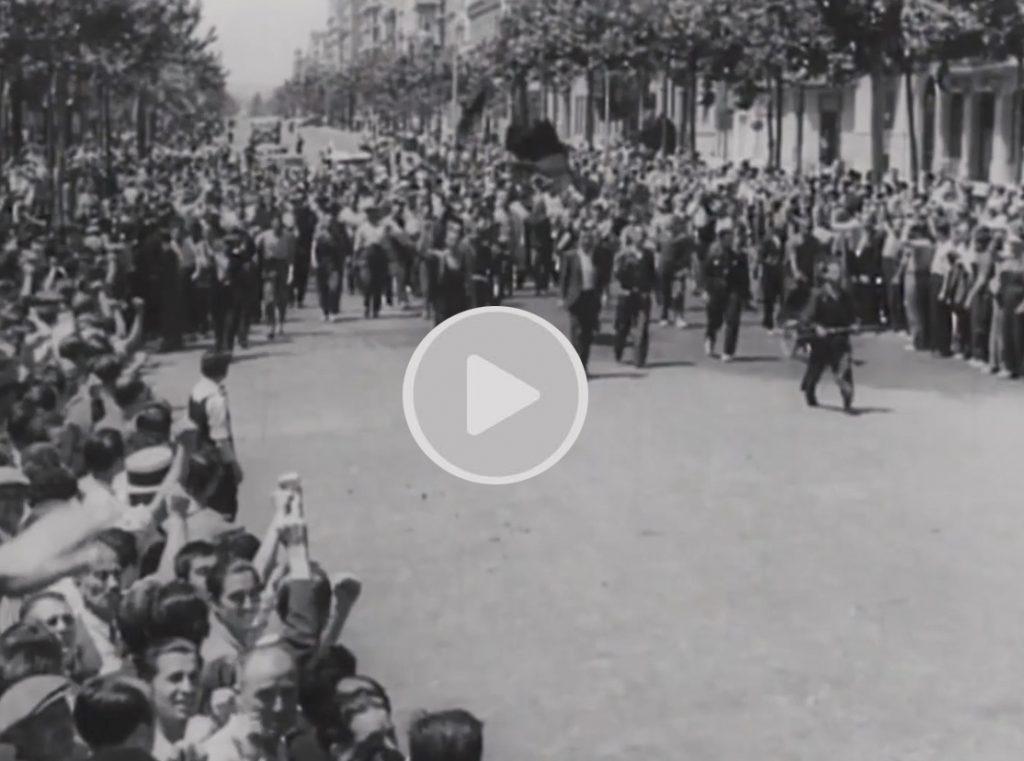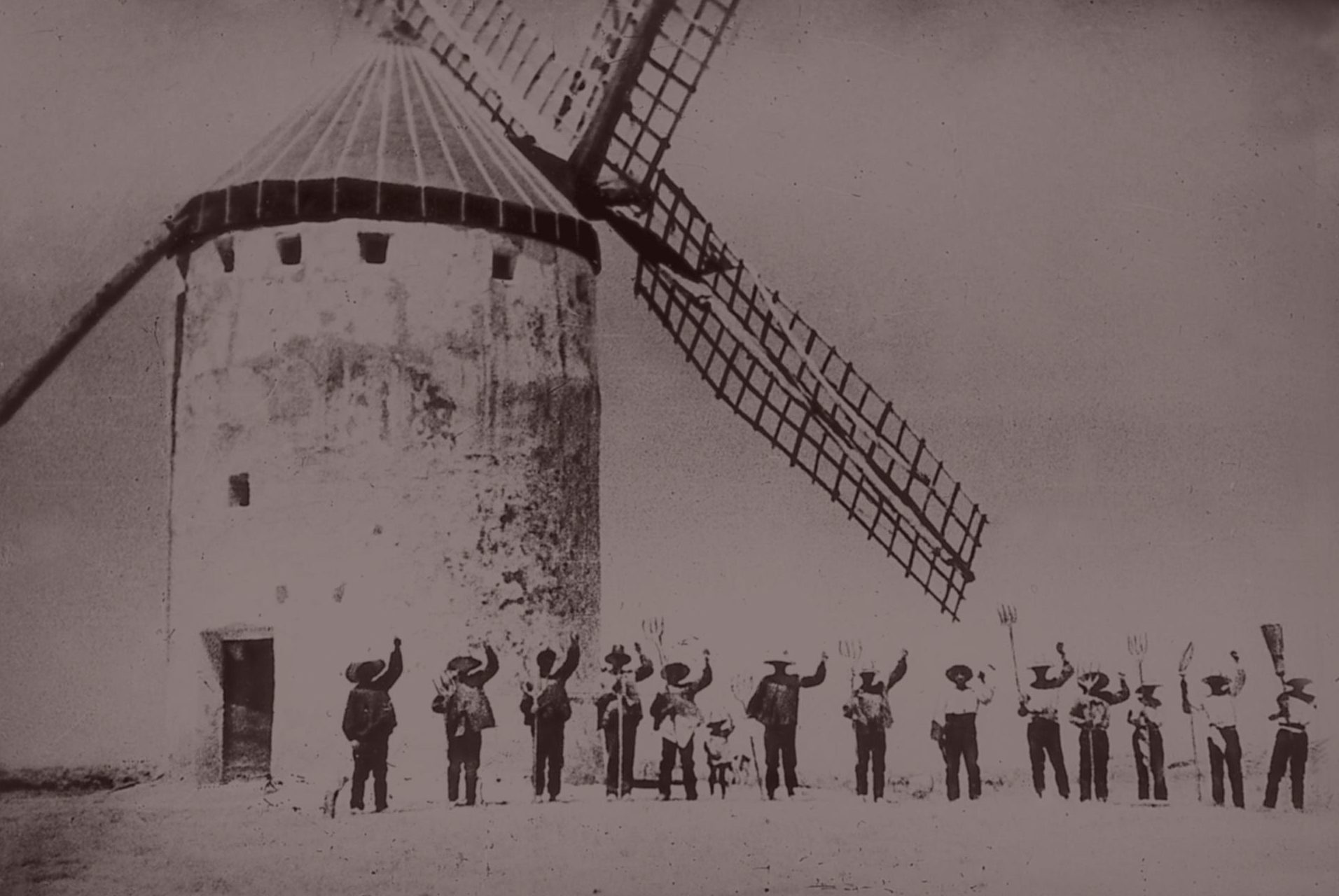
HOMAGE to
CATALONia
A journey to the heart of the revolution and the Spanish War
A documentary film by Frédéric Goldbronn adapted from the eponymous story by George Orwell,
with the voice of Bruno Podalydès.
Original music composed and performed by : Catherine Delaunay (clarinets), Bruno Ducret (cello, guitar), Tony Hymas (piano), Guillaume Séguron (double bass) and produced by Jean Rochard (nato).
Produced by Les Films d’Ici, with the participation of the channel Histoire, the association 24 août 1944 and REDHIC.
Call for crowdfunding
Homage to Catalonia is a book from writer George Orwell recounting his involvement in the Spanish Revolution and Civil War. This book is haunted by images, which we find in cinematographic newsreels and in particular in the reports filmed by the anarchist operators of the CNT in Barcelona and on the Aragon front. By exploring these images, the film aims to share Orwell’s experience in Spain through a new experience, a cinema experience.
THE FILM
From the book…
Homage to Catalonia is both a personal testimony and a political look at the revolution and the Spanish Civil War. Enlisted at the end of December 1936 in the POUM militia, an anti-Stalinist Marxist party to which his contacts in England led him, Orwell fought on the Aragon front until the end of April 1937. After the enthusiastic discovery of the revolution in Barcelona, he experienced destitution, but also the fraternity that reigned in the workers’ militias, which were according to him « a sort of microcosm of a classless society ». On leave, he returned to Barcelona where, at the beginning of May, the Stalinists allied with the parties of the republican bourgeoisie attempted to disarm the anarchists, who still controlled many strategic sectors, provoking a week of clashes. A few days after his return to the front, a fascist bullet passed through his throat and he was evacuated to the military hospital in Tarragona. In Barcelona, the hunt for “Hitler-Trotskyists” rages. The POUM is outlawed, its activists are imprisoned or murdered. The enchanted city of the first pages of the book has become a hell where Stalin’s agents reign in terror and madness. Wanted by the police and still speechless since his injury, Orwell must hide at night like a criminal in ruined churches and has no other solution than to flee Spain with his wife Eileen, who worked for the POUM in Barcelona, disguised as rich English tourists.
The time of dreams, the time of war, the time of betrayal, Homage to Catalonia tells a tragedy in three acts, which is that of anti-fascist Spain but also that of the international workers’ movement and that of Europe, as the Spanish Civil War appears to be a dress rehearsal for the Second World War.
“And, after all, instead of disillusioning me it deeply attracted me. The effect was to make my desire to see Socialism established much more actual than it had been before” Orwell wrote on his return from Spain. If his experience leaves him with a faith “Curiously enough the whole experience has left me with not less but more belief in the decency of human beings.”, it conversely inspires in him a definitive horror for the totalitarian model and the propaganda apparatus, which will be expressed in the mode of allegory to denounce the revolution betrayed in Animal Farm and in the dystopian anticipation of 1984, but even then, like his hero Winston, he will say » If there was hope, it must lie in the proles ».
Because it denounced Stalin’s policies in Spain, Homage to Catalonia, when it was published in April 1938, encountered the silence or hostility of a large part of left-wing criticism. If the book has become a classic today, hailed for its depth and lucidity, it is because the political conditions of its reception have changed (“Orwellian” has become an adjective in everyday language and the Soviet model a memory), but also because the strength of his writing allows him to withstand time..
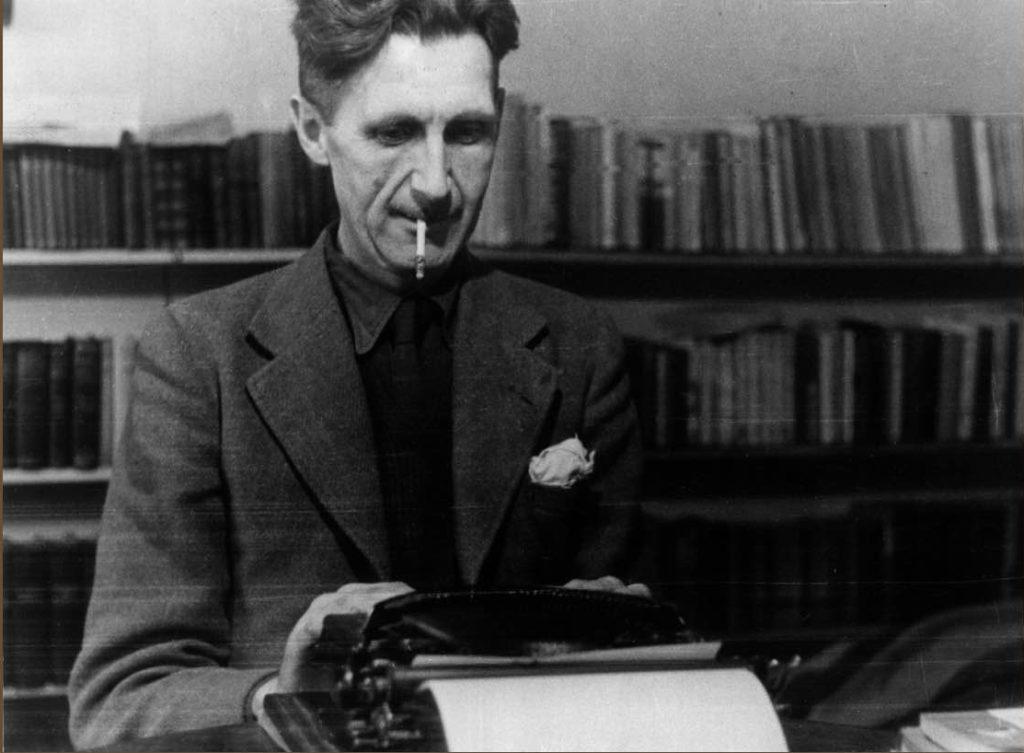
…to the film
Orwell wrote Homage to Catalonia from materials provided by his memory, his notebooks having been seized by the police during a raid on his hotel room in Barcelona. It is a book haunted by images, which we find in cinematographic newsreels and in particular in the reports filmed in Barcelona and on the Aragon front by the operators of the CNT, the powerful anarchist union which controlled the film industry in Catalonia. During the civil war, the CNT produced nearly 200 reports and short documentary films, which were edited and given sound in Barcelona and then broadcast as the first part of the program in cinemas, leaving to posterity an exceptional collection on the Western proletarian revolution alone of the 20th century.
Because the protagonists are caught in the moment of the event and do not know what will happen next, these images invariably remain in the present, a present which is itself tended towards a future (the belief of the Spanish revolutionaries in « another future »). Taken from the narrator’s story, they are nevertheless addressed to us as memories, moments that return ; the memory of a time that we did not live through, but of which we are the heirs, the memory of the vanquished. A memory which also implicitly questions our present, this dystopian twenty-first century where Orwell seems more present than ever.
The script for the film Homage to Catalonia won the Scam grant, Brouillon d’un rêve, and won the Grand Prize for the historical documentary project at the Rendez-vous de l’histoire in Blois in 2023..
Teaser (french version)
THE DIRECTOR
Frédéric Goldbronn discovered the images of the Spanish revolution in July 1977 in Barcelona, when, as a young anarchist activist and fervent reader of Homage to Catalonia, he participated in the Jornadas libertarias internacionales, when Spanish anarchism seemed to be reborn from its ashes after forty years of dictatorship.
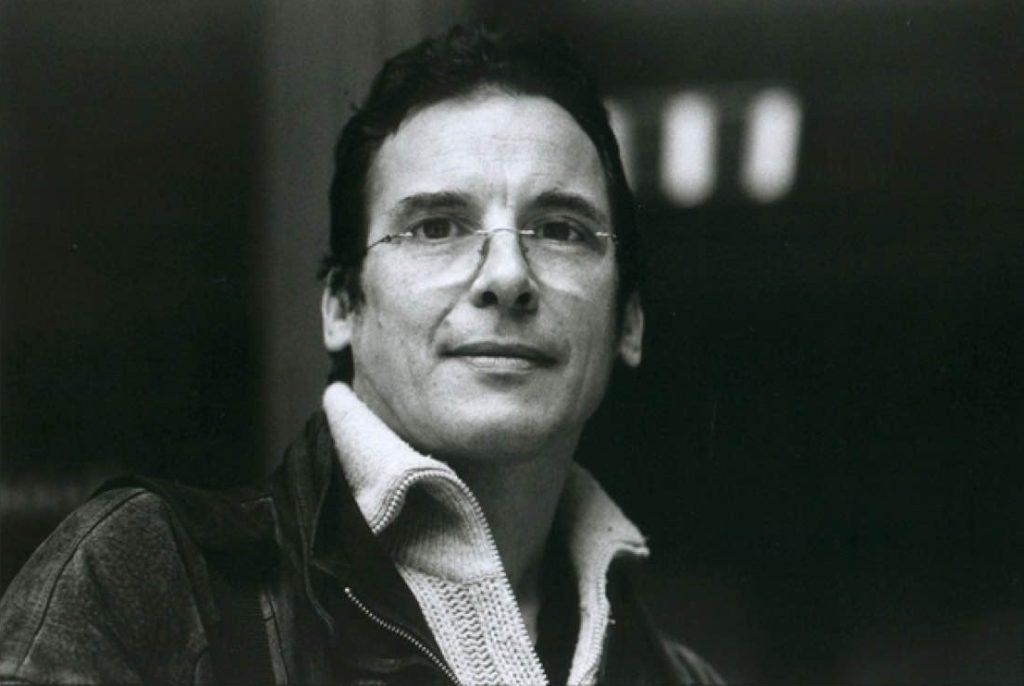
Trained in documentary cinema at the Ateliers Varan in the early 1990s, he stubbornly digs into his filmography a path of cinema which seeks, in the footsteps of Walter Benjamin, « the narrow door of the past » by exploring his traces, a cinema which draws its imagination from the documentary part which constituted it.
Filmography
THE GHOSTS OF THE SANATORIUM
(2020, 59 min.)
“In the filmmaker’s films, it is the images of the past that bring life back to life. The Ghosts of the sanatorium bring about a double resurrection : that of the student sanatorium of Saint-Hilaire-du-Touvet in Isère as well as the presence within its walls of an illustrious writer, Roland Barthes. Frédéric Goldbronn breathes a hypnotic force into his film, which takes on the trappings of a musical score. » (Eva Markovits, review Images documentaires)
FACES OF AN ABSENT
(2013, 95 min.)
“I remain deeply moved by this quest which leaves a woman with her dark side, her wounds, the price of a freedom that was unacceptable at the time. This act of love which brings together her five separated children around the director’s mother also questions family, motherhood and sibling bonds. That’s wonderful. » (Annie Ernaux)
NEXT YEAR, THE REVOLUTION
(2010, 71 min.)
“Next Year, the Revolution is a film dedicated to Maurice Rajsfus. If anarchists and all freedom enthusiasts know Maurice well through his fifty anti-authoritarian and anti-colonialist works, as well as his articles in the columns of Le Monde Libertaire, we know much less about the author’s intimate history. Thanks to this film, the error is corrected. » (Le Monde libertaire)
ELNE’S MOTHERHOOD
(2002, 56 min.)
“Elne’s motherhood ward appears today as a luminous aberration, an unexpected sanctuary in the middle of the hell represented by the internment camps of Argelès, Gurs, Rivesaltes or Saint-Cyprien. » (Télérama)
DIEGO
(1999, 40 min.)
“How, from the depths of a bar in Barcelona, an old man, who has given up nothing, revives the only Western proletarian revolution, that of July 1936, the one that the writer George Orwell would later salute in his Homage to Catalonia. » (Edouard Waintrop, Libération)
GEORGES COURTOIS, FACES OF A REFRACTOR
(1996, 52 min.)
“This documentary shot with obvious sympathy confronts the rebellious, cheeky inmate, who goes to great lengths to demonstrate that he has not been broken, with images of his past, his childhood, with the brief moments of happiness experienced between two stays in prison. But above all he gives voice to his wife, magnificent, painful and tender. » (Le Monde)
THE PRODUCTION
The film, with a planned duration of 60 minutes, is produced by Richard Copans at Films d’Ici, with contributions from the Histoire channel and the CNC support fund. CNT films are co-produced by the 24 août 1944 association and REDHIC (Research and documentation of contemporary history), which distributes them in France.
The total budget of the film is 80,000 euros. The production has raised 65,000 euros to date. There is still 15,000 euros missing to have more editing time, obtain additional archives from agencies, do the finishing touches and in particular the sound editing which plays an essential role in this film.
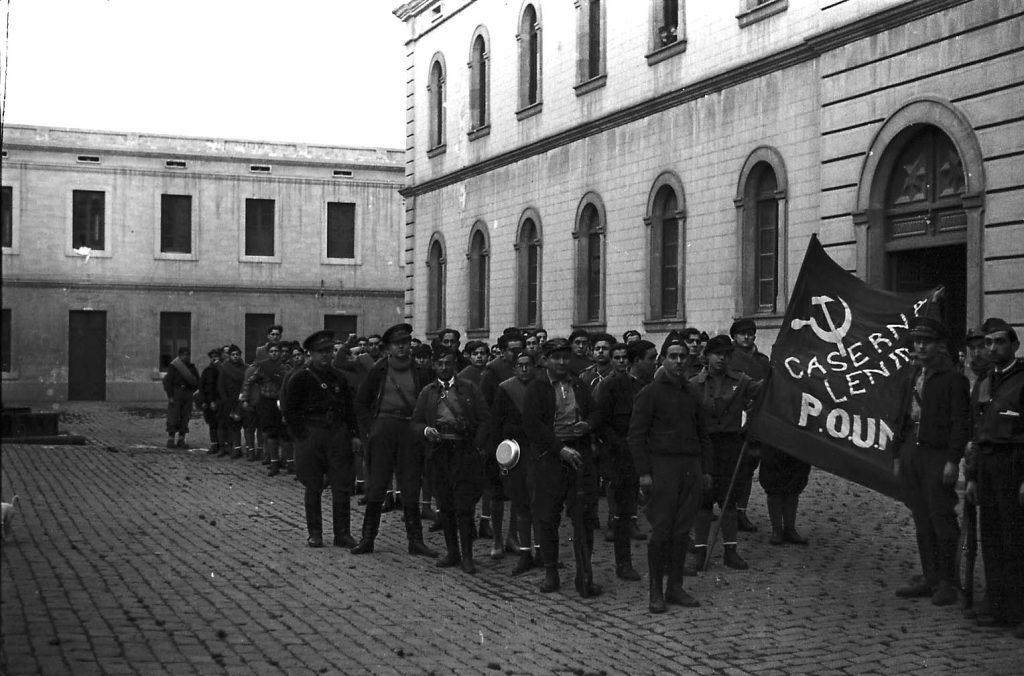
Call for crowdfunding
This is why we are launching a call for participatory and activist funding, which we believe corresponds to the spirit and form of this documentary film. We hope to raise 15,000 euros with this crowdfunding and thus be able to complete the film.
Contributors will receive a secure link to the film as well as an invitation to previews.

